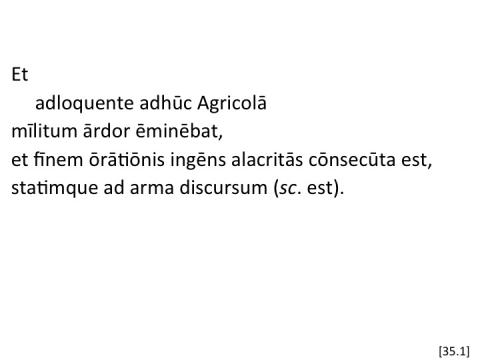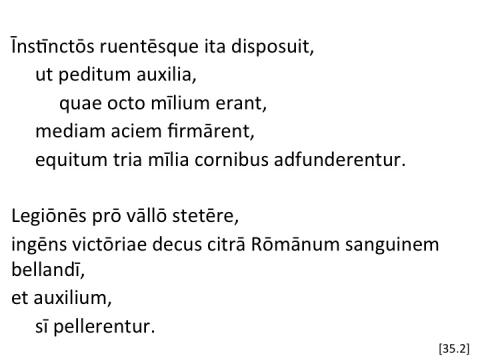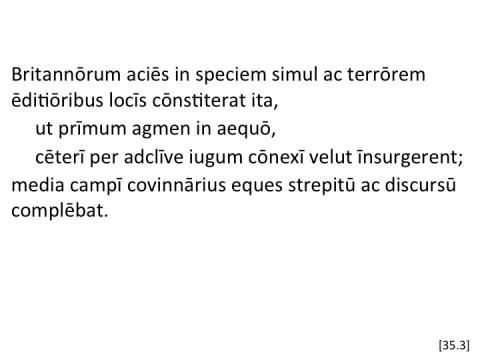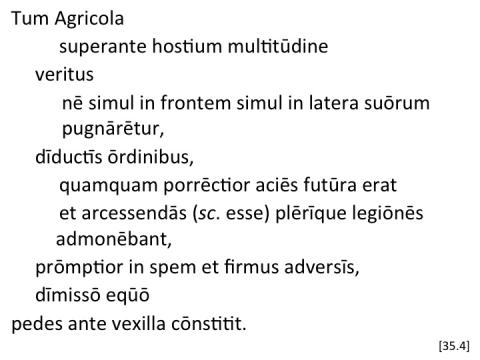Overview: Agricola's speech is received with enthusiasm; alignment of the Roman army; Agricola takes command in person. (Stuart); this chapter begins on f. 62r of the codex Aesinas.
35.1
adhūc = etiam nunc. (Stuart)
ēminēbat ... cōnsecūta est: notice the difference of tense. (Pearce) mīlitum ārdor ēminēbat: "the enthusiasm of the soldiers rose to a high pitch." The effect of a general's speech is often described in similar terms ... . (Gudeman)
alacritās: see note on 33.1. (Stuart)
statimque ad arma discursum: sc. est. (Damon); "there was a sudden rush to arms." (Gudeman)
35.2
īnstīnctōs: "in high feather." (Gudeman); "roused," as in 16.1. (Damon)
octo mīlium: genitive of description. (Pearce) [A&G 345.b]
mediam aciem firmārent: "should make a strong centre." See 14.3. (Pearce)
adfunderentur: the word is used metaphorically to express the dispatch with which the cavalry was moved into position. Translate: "were thrown into position on." (Stuart)
legiōnēs: Agricola had with him three legions, and possibly four. In either case, however, they were not present in full strength, since contingents must have been left in England to guard the camps. A conservative estimate would allow him 15,000 legionaries and a total army of about 28,000. (Stuart)
prō: "in front of." (Stuart)
ingēns victōriae decus: victoriae, dative; like victoribus in 33.5 = "if they conquered." It corresponds to si pellerentur. (Pearce) victōriae: "in case of victory." (Stuart) decus: in apposition with the whole idea of the preceding sentence; "an arrangement which would secure him the honor." (Stuart) [A&G 282] decus, etc.: to gain a victorious battle without shedding the blood of Roman legionaries enhanced the glory, while in the emergency of a repulse of the non-Roman auxiliaries they, with strength unimpaired, were in position to turn disaster into success. (Gudeman)
citrā = sine. See note ch. 1.3. (Gudeman)
Rōmānum: of Roman citizens, since the legionaries were Romans in a political sense merely. (Stuart)
bellandī: explanatory genitive, telling in what the glory consists. (Stuart) [A&G 345, with citra Romanum sanguinem as the requisite modifier]; depends on decus, which it explains: "the glory, namely, of an action fought without shedding Roman blood." (Pearce)
auxilium: in apposition with legiones only (and not with the whole sentence legiones ... stetere like decus above). (Pearce)
pellerentur: sc. auxilia, which, though easily supplied from the context, would probably have been expressed had not auxilium preceded (Gudeman)
35.3
in speciem simul ac terrōrem: observe that what Calgacus had warned against and ridiculed, ne terreat vanus adspectus et ... fulgor (ch. 32.3), is here asserted to have been resorted to by the Caledonians themselves. Terror is the result of species, and simul is used to indicate their belief that cause and effect would be virtually coincident. (Gudeman)
in aequō: sc. consisteret, to be supplied from the preceding constiterat. (Gudeman)
cōnexī: "in solid ranks." (Stuart); "in close array." (Gudeman)
velut īnsurgerent: because of the close formation the rising ground on which the enemy stood was invisible, so that it seemed to the Romans as if they were confronted by a hill of men. Translate: "the rest ... towered on high as it were." (Stuart); why velut, as they did actually rise? Perhaps the idea in Tacitus' mind (probably the tiers of seats in a theatre) was more figurative than his language, which does not seem to need the apologetic velut. (Pearce); i.e. seemed actually to rise terrace-like one above the other. It was this that constituted the imposing appearance just mentioned. Tacitus and post-Augustan writers generally do not often apologize for metaphors, but here velut was necessary, for otherwise the predicate would have belonged to in aequo as well. (Gudeman)
media campī: the space between the two armies. (Stuart); the plain stretching from the foot of the adclive iugum to the rear of the primum agmen. (Gudeman)
covinnārius eques: "the chariot corps." (Stuart); the covinnus was a scythe-bearing chariot. (Pearce)
35.4
dīductīs ōrdinibus: "widening the ranks." (Gudeman)
porrēctior: "too much extended" in proportion to its depth; i.e., "too thin." (Pearce)
futūra erat: "might prove to be," a frequent meaning of the future participle. For quamquam with the indicative, very unusual in Tacitus, see ch. 36.3. (Gudeman)
arcessendās: sc. esse, indirect discourse introduced by admonebant. (Damon)
prōmptior: i.e. than the plerique just mentioned. (Pearce) prōmptior in spem: "more sanguine" than his advisers. (Stuart); "rather sanguine." (Gudeman)
adversīs: dative, as in 22.4 comis bonis. (Pearce) [A&G 383-84] firmus adversīs: "steadfast in the face of adversity." Elsewhere Tacitus uses the preposition adversus with firmus, but this was here excluded by adversis. The change between an ablative or dative and a prepositional clause is, however, characteristic of the author. See Introd. p. xxxiv #2. (Gudeman)
pedes: a predicate nominative modifying Agricola, "as a footsoldier." (Damon) [A&G 283-84]
ante vexilla: i.e. at the head of the auxiliary infantry. (Pearce) vexilla: the standards of the auxiliaries as distinguished from the signa of the legions. (Gudeman)




